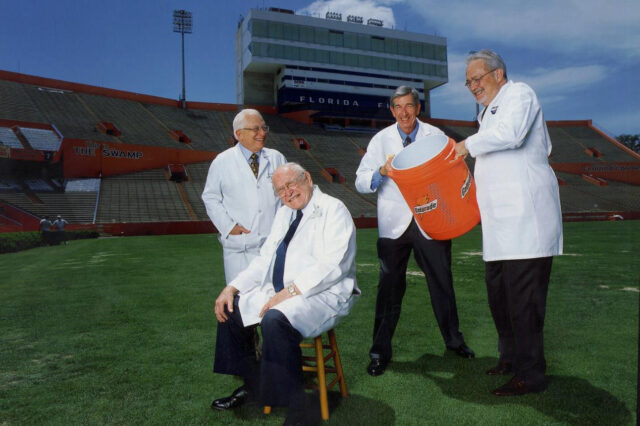Electrolytes: Tiny ions that pack a big punch

Gatorade is a staple for athletes in Florida, where the thirst-quenching beverage was born. This year, the sports standard is celebrating 50 years on the sidelines, but how exactly does Gatorade aid the body?
The answer is electrolytes: positively and negatively charged substances that help maintain the correct electrochemical charge across the membranes, according to Mark S. Segal, M.D., Ph.D., a professor in the UF College of Medicine and chief of the division of nephrology, hypertension and renal transplantation. Maintaining the concentration of positive and negative ions within your body’s cells is essential for keeping athletes hydrated.
“For athletes who are exercising and sweating profusely, keeping hydrated and maintaining their sodium balance will help them perform sufficiently better." - Mark Segal, M.D.
Rehydration with electrolytes is essential for athletes, because when they sweat too much, the volume of sodium, chloride and potassium is depleted in their blood. Drinking water with electrolytes to rehydrate maintains a good cardiac output, which helps maintain circulation of blood through the muscles and organs, said Segal. In fact, athletes will be given electrolytes at the hospital if they become dehydrated to the point of needing medical attention.
“For athletes who are exercising and sweating profusely, keeping hydrated and maintaining their sodium balance will help them perform sufficiently better,” said Segal.
In 1965, Dwayne Douglas, the then-assistant football coach of the Florida Gators, asked Robert Cade, M.D., a professor of renal medicine at UF, why players weren’t urinating during the game. Cade and the other inventors of Gatorade collected sweat from athletes to measure potassium, sodium and chloride levels after strenuous activity, and discovered that the athletes were losing high levels of water, sodium, chloride and potassium while they were sweating.
“Before Gatorade, athletes were told not to drink water because it was a sign of weakness and because drinking was believed to cause cramping,” said Segal. “So with Gatorade, there was a paradigm shift in exercising athletes.”
Learn more about the history of Gatorade (http://es.pn/1M6iNPc) and the science behind the iconic drink. http://bit.ly/1MO5rK4